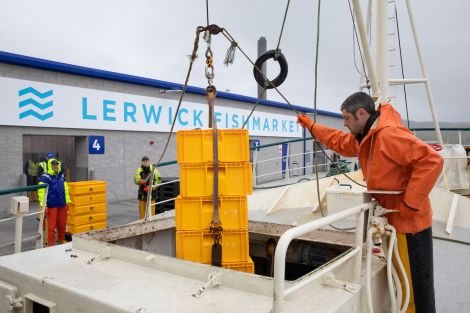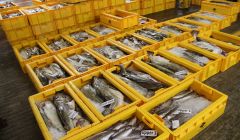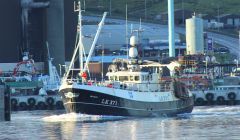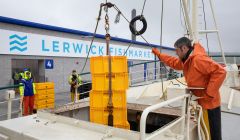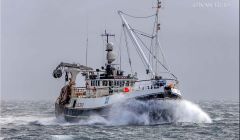Marine / Fishing scaled back as exports to Europe come to a halt
THE LOCAL whitefish fleet has almost suspended its fishing efforts to avoid high quality seafood from Shetland getting stuck and wasted in the export bottlenecks created by post-Brexit bureaucracy.
There was no fish market held on Wednesday and very limited landings are expected until well into next week as a direct consequence of the crisis situation at the French border and the dispatch centre at Larkhall, near Glasgow.
With more than half of the whitefish landed at Lerwick and Scalloway exported to the EU, the continental market is hugely important to the local fleet.
With no guarantee from the main industry haulier DFDS that fresh fish can reach the main market at Boulogne within two days of being auctioned in Shetland, the industry locally decided to scale back.
Describing the situation as a “real mess”, Brian Isbister, the chief executive of the Shetland Fish Producers’ Organisation (SFPO) said there was no point in stacking up fish only for it to be wasted.
“All the boats have taken heed and have slowed down their fishing until the backlog has cleared and the new system is working,” he said.
Isles MP Alistair Carmichael, meanwhile, secured an urgent debate in the Commons this morning (Thursday) on the impact the government’s trade deal with the EU is having on the fishing industry, in which he accused the government of “breathtaking complacency”.
Post-Brexit problems at the borders with health checks, IT systems and customs documents have been widely reported nationally over recent days.
DEFRA secretary George Eustice responded to Carmichael by saying “they are only teething problems – once people get used to using the paperwork goods will flow normally”, adding that the EU declined to offer a grace period to begin with.
Isbister said government should have anticipated these problems. But with a post-Brexit trade deal hammered out just before Christmas, a lot of the finer detail was either not considered or left for officials to sort out later.
Become a member of Shetland News
Yet, with the UK government’s decision to pursue a hard Brexit and leaving the single market as well as the customs union, it should have been clear from early on that a significant amount of new paperwork would be needed when exporting to the EU. That is regardless of whether the UK and EU agreed a trade deal or not.
Isbister said the local traders were well aware of the changes and, in conjunction with the local authority, which issues health certificates and certifies fishing boats, the feeling was that the industry was well prepared for Brexit.
He said there is now some confidence from within the haulage industry that from next week a three-day delivery to Boulogne can be guaranteed.
“That’s not ideal, but it is better news than what we had this past few days,” Isbister said.
The amount of fish landed in Shetland is also expected to go up again as of next week.
“The demand is still there, the continental market is still buying products from the UK – we just have to learn how to get it transported there in the new regime,” Isbister said.
“It will be a week or two before we get to 6,000 to 7,000 boxes per week – but once things settle, the average number will hopefully go up again.
“There is certainly scope here with quota and now capacity at both the new markets.”
Become a member of Shetland News
Shetland News is asking its readers to consider paying for membership to get additional perks:
- Removal of third-party ads;
- Bookmark posts to read later;
- Exclusive curated weekly newsletter;
- Hide membership messages;
- Comments open for discussion.
If you appreciate what we do and feel strongly about impartial local journalism, then please become a member of Shetland News by either making a single payment, or setting up a monthly, quarterly or yearly subscription.






